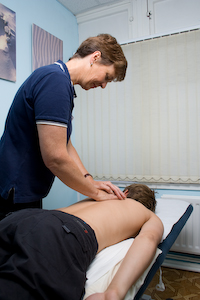FAQs
 Q What exactly does a Chartered Physiotherapist do?
Q What exactly does a Chartered Physiotherapist do?
A Chartered Physiotherapists treat injury and disease by correcting and improving the body’s own mechanisms, without the use of drugs or medication prescribed by a doctor.
Do I have to be referred by a Doctor?
No, not necessarily. You may consult a Chartered Physiotherapist without a doctor’s referral, but contact will usually be maintained between your GP and Physiotherapist. Chartered Physiotherapists work in close co-operation with GP’s in much the same way as consultants do, and this relationship is for the ultimate benefit of you, the patient. If you have private medical insurance and wish to claim then you will probably need to see a doctor and be referred.
The practice is registered with all major private medical insurance companies such as BUPA, WPA, AXA PPP, Norwich union
What is the cost?
Initial appointment and assessment £45 (If you pay on the day £42)
Follow up appointment £40 (pay on the day £37)
Payment by cash, cheque or bank transfer only at the moment.
 How many sessions will I need?
How many sessions will I need?
Frequency and length of treatment depend on your condition, occasionally only one or two treatments and advice are enough, for other conditions 6-8 treatments are the norm.
What sort of treatments do Chartered Physiotherapists use?
The modern Chartered Physiotherapist uses a wide range of skills including manipulation, acupuncture, mobilisation, massage and exercises, often aided by the use of sophisticated electronic and electrical apparatus – all designed to help in restoring function, the relief of pain and to promote healing. Preventative measures are very important in physiotherapy. The Chartered Physiotherapist will spend time teaching the patient how to avoid recurrence of his/her problem.
How does a Chartered Physiotherapist decide the best form of treatment?
Chartered Physiotherapists undertake a thorough assessment of each problem. This will involve a thorough examination, together an understanding of your work, rest and recreational activities. This full assessment may identify a problem, which is situated some distance from where the pain is felt. It also ensures that the diagnosis and treatment will relate to you and your whole lifestyle. After full consultation with you and, where appropriate, with with your doctor, the Chartered Physiotherapist will decide on the best form of treatment.
How does Chartered Physiotherapy differ from the ‘alternative’ forms of healing?
The methods used by ‘alternative’ therapies differ widely, but most of the theories and principles which govern them are included as standard practice in Chartered Physiotherapy, which is the ‘orthodox alternative’. Physiotherapy is a medically recognised treatment with physiotherapists working closely with GP’s and consultants. Many Chartered Physiotherapists have developed additional skills in areas such as acupuncture; relaxation therapy, aqua-aerobic water fitness programmes, Alexander technique, aromatherapy, cranio-sacral therapy and Pilates.
 How do I know if a Chartered Physiotherapist is fully trained and has a qualification recognised by the state?
How do I know if a Chartered Physiotherapist is fully trained and has a qualification recognised by the state?
Only members of the Chartered Society of Physiotherapy, (known as ‘Chartered Physiotherapists’) and have the designatory letters ‘MCSP’ or ‘FCSP’ after their name, and health professions council registered (HPC reg) have undergone the required training and passed the necessary state recognised examinations to enable them to practice within the within the NHS or in Private Practice.
Can I be treated by a Chartered Physiotherapist outside the National Health Service?
Yes. Anyone can receive private health treatment from a Chartered Physiotherapist in private practice. Most private medical insurance schemes cover for physiotherapy only when it is given by a Chartered and Health Professions council Registered Physiotherapist.
This information is taken from the organisation of Chartered Physiotherapists in private practice Physiotherapy for you Leaflet.